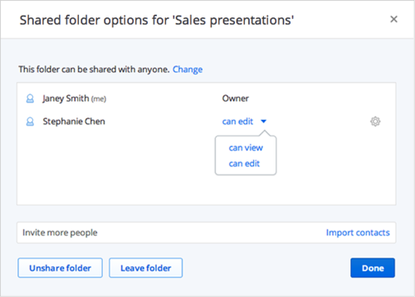Dropbox for Business folders can now be shared in read-only mode
- 02 July, 2014 04:03

Dropbox for Business users can now share folders with colleagues without necessarily giving them rights to edit their content
Users of Dropbox for Business will now be able to share folders with colleagues without necessarily giving them rights to edit their content.
Giving users read-only access to folders hasn't been possible until now: Dropbox for Business users by default granted edit rights to the people they shared the folders with.
Dropbox makes this move as it faces heightening pressure both in the consumer and enterprise cloud storage and file share markets from rivals like Microsoft and Google.
Dropbox hasn't rolled out the new feature to all of its business customers, but admins can turn it on for their users. The company plans to gather feedback from early adopters and make it broadly available later on.
"With shared folders, previously there were only owners and editors, so we're adding the option of viewers," said Dropbox for Business product manager Anand Subramani.
This new option will be convenient in cases where, say, the human resources department wants to make 401(k) plan documents available for everyone on staff to read, but not modify. This way, Dropbox for Business extends its scope from being a tool for collaborating on files to one that can also be used to publish content for the passive consumption of many.
There are no plans currently to offer this feature to users of the consumer version of the Dropbox cloud storage and file sharing service, which is used by about 300 million people. The service is also in use to varying degrees of scope in about 4 million businesses, according to the company.
Dropbox for Business, which costs $15 per user/month for a minimum of five users, exited its beta testing period in April and includes a variety of IT administration controls intended to make it suitable for workplace use. Those IT management features include the ability to remotely wipe Dropbox files from employee devices, to track how and with whom users share files via audit logs, and to transfer control of employee accounts.
With the introduction of Dropbox for Business, the company also made it possible for people to have both a personal Dropbox account and a separate Business account provisioned by their employer, and to be logged into both at the same time on the devices they use.
The business version of Dropbox also gives IT administrators control over whether employees can or can't share files with external users. The IT admins can also delegate down to end users the decision of whether a particular file or folder can be shared externally or not.
With Dropbox for Business, the company is trying to replicate in the business world the popularity it has among consumers, but competition in both markets is reaching cut-throat levels.
Microsoft and Google, which offer their respective cloud storage and file share services to both consumers and businesses, are locked in a vicious price war which is squeezing competitors like Dropbox.
For example, Microsoft recently announced its plan to more than double to 15GB the storage capacity in the free, stand-alone OneDrive service for consumers, while also slashing the cost of additional storage. An extra 100GB will now cost US$1.99 per user/month, down from $7.49, and 200GB will cost $3.99 per user/month, down from $11.49.
For customers of the Office 365 Home, Office 365 University and Office 365 Personal productivity app suites, Microsoft is sending OneDrive storage to the stratosphere, from 20GB to 1TB per user.
Meanwhile, with a free Google account, people get 15GB of storage for files in Drive, Gmail messages and Google+ photos, and can purchase 100GB of additional storage for $1.99 per month. A free Google account also includes Docs, a set of office productivity apps.
By comparison, Dropbox options for consumers start with a free 2GB plan, and the option to upgrade to 100GB for $9.99 per user/month, to 200GB for $19.99 per user/month or 500GB for $49.99 per user/month.
In the enterprise market, Microsoft announced in April an increase in per-user storage of OneDrive for Business from 25GB to 1TB. OneDrive for Business is the workplace version of OneDrive, designed for employees to store, share and sync their personal work files.
The increase applied to the stand-alone version of OneDrive for Business, which costs $5 per month with the free Office Online, and to OneDrive for Business bundled with the workplace versions of Office 365.
Last week, Google announced a new version of its Apps for Business cloud email and collaboration suite called Drive for Work which includes, among other things, unlimited storage for all users. It costs $10 per user/month.
Subramani declined to comment when asked if Dropbox planned to respond with its own price adjustments to Dropbox and Dropbox for Business at some point.
In addition to Google and Microsoft, Dropbox for Business also faces other strong competitors, including offerings from Box, IBM, YouSendIt, Citrix, Accellion, Egnyte and WatchDox.
Juan Carlos Perez covers enterprise communication/collaboration suites, operating systems, browsers and general technology breaking news for The IDG News Service. Follow Juan on Twitter at @JuanCPerezIDG.

